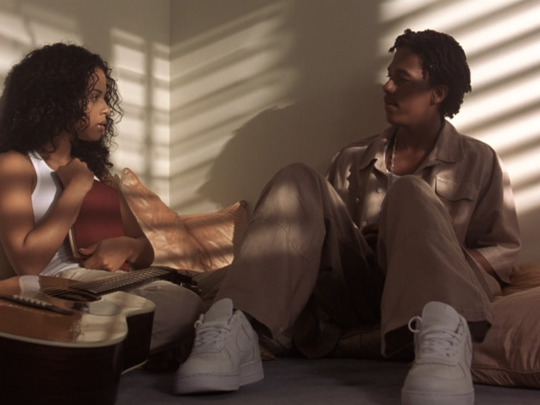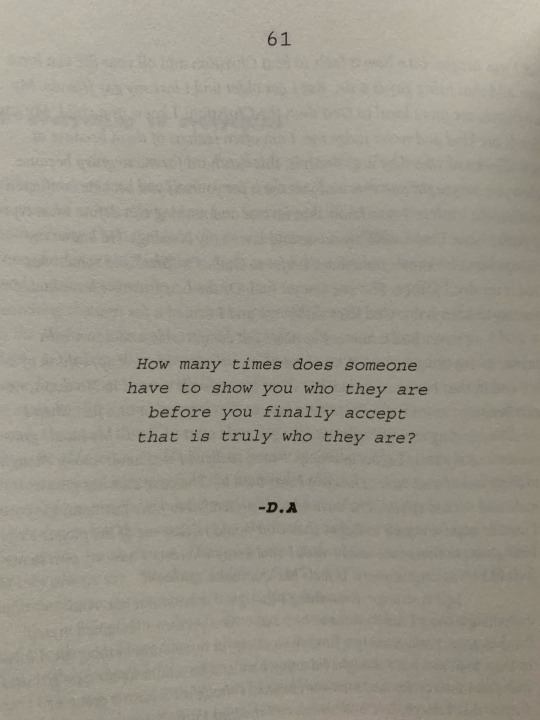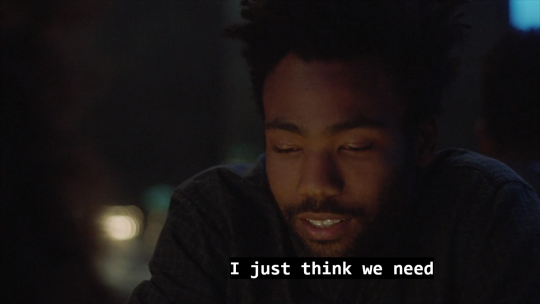Video
a day late.
#national coming out day#coming out day#queer#gay#gay lady#woman of color#women of color#gay woman#queer woman#queer woman of color#qwoc#queer women of color#black woman#black lesbian#black gay woman
3 notes
·
View notes
Quote
Books are mirrors: you only see in them what you already have inside you.
(via notjustinspirationalquotes)
62 notes
·
View notes
Video
youtube
“What You Won’t Do” - Savannah Cristina
0 notes
Text
I really needed this today. Everyday I battle releasing a love that wasn’t gentle, that wasn’t reciprocal, mutually intentional, empathetic or respectful. I’ve been looking for the words to explain how I feel and ran across this post, that hit the nail on the head.
At some point, you have to stop making excuses, stop blaming yourself and just call a spade a spade and let things be. Not everyone deserved your loyalty, or the benefit of the doubt when they’ve hurt you, and continually choose to show no remorse.
Sometimes it’s just that you have to have a villain in your storyline to teach you what not to be.
THE CAPACITY TO GIVE UP ON PEOPLE
For noble and very understandable reasons, we’ve come to associate maturity and kindness with a capacity not to give up on people. Our heroes and heroines keep faith with those they love. They don’t throw in the towel when trouble rears its head. They put up with the hardships and friction. Running away is disloyalty. Many things are dispensable: people shouldn’t be.
But this broad and generous truth can be in danger of missing out on an important caveat: that health and maturity may also require, at points, a subtle capacity to give up on one or two people, not always and indefinitely to keep giving them the benefit of the doubt, not invariably to forgive them one more time, not relentlessly to imagine the nice things they might really really have meant beneath the thoughtless and unkind things they actually did and said. We might need occasionally to despair of someone - as the price to pay for keeping faith with ourselves.
It’s in the lives of children that we see the inability to give up on someone take on its starkest, and most regrettable forms. By their nature and circumstance, children cannot give up on those entrusted with looking after them if and when the latter are disappointing or cruel; children present us with troubling exemplars of the impulse to keep going at any cost with a person who offers one love - even when that love is blended with the darkest and most unhealthy elements. Even when beset by emotional neglect, coldness, unreliability, meanness, brusqueness, broken promises to improve and worse, children will think some of the following:
- ‘Maybe they will change’
The child places infinite faith in the capacity of the loved one to evolve in a desired direction. Whatever the lack of outward evidence, the child imagines the caregiver coming to important realisations, rethinking their position, seeing the light. By a form of magical thinking, the child clings to the idea of the adult being on the cusp of transforming themselves into the person they so badly need them to be.
- ‘Maybe the outward behaviour is bad, but inside they are good’
Heaven knows the outward stuff may not be pretty. There might be shouting, stonewalling, outright beastliness… but the child holds on to the notion that - where it counts - the adult is good. The fundamental truth about them must be sound: the center of them is sweet, touching, warm and decent. The child may be the butt of the adult’s most vicious moods but they are, through it all, always also their most devoted and fervent defenders.
- ‘Maybe the problem is that I am bad…’
The difficulties can’t be disputed but their origins are up for grabs and here the child shows a tragically intense degree of imagination. Yes, there is badness around, but that must be because they, the child, are ultimately somehow to blame. If only they could be different, the adult wouldn’t be so tricky. There is one thought that must be warded off above all others: that the adult might just be a mean and self-serving mediocrity. That is simply not possible. Better to be a monster or wretch oneself than to have ended up in the hands of a parent unworthy of respect.
- ‘No one and nothing else could be better.’
Children have no options. They can’t run away, begin again or say they’ve had enough. The world isn’t broad. The best of childhoods is an open prison. Therefore, children don’t even picture themselves in other circumstances. What is has to be. Those who have most to complain about don’t even raise their voice.
Frighteningly, each of these positions has its adult equivalent. In certain unfulfilling relationships, we may have as much of a skill as the most unfortunate child (probably the child we once were) at the art of justifying why we are here, why we are to blame, why they are innocent and why we cannot move.
It is we in particular, those remorselessly skilled at not giving up, who need to hear a curious-sounding lesson in being a little less loyal. We need to hear that, surprisingly, some people just don’t change: that their characters have been bolted shut through trauma and there is no chance that they will ever - whatever they may say and however intensely they promise - display any evolution. We need to hear that surprisingly, some people aren’t entirely good and we aren’t necessarily the problem. We need to learn to blame and get annoyed with someone other than ourselves. We need to do something very strange: walk away. This is no sign of cowardice or weakness of character. It’s a sign that we have (finally) learnt to love ourselves and so place our needs where these should always have been: at the center of our considerations.
For a copy of this essay click here.
1 note
·
View note
Text
THE CAPACITY TO GIVE UP ON PEOPLE
For noble and very understandable reasons, we've come to associate maturity and kindness with a capacity not to give up on people. Our heroes and heroines keep faith with those they love. They don't throw in the towel when trouble rears its head. They put up with the hardships and friction. Running away is disloyalty. Many things are dispensable: people shouldn't be.
But this broad and generous truth can be in danger of missing out on an important caveat: that health and maturity may also require, at points, a subtle capacity to give up on one or two people, not always and indefinitely to keep giving them the benefit of the doubt, not invariably to forgive them one more time, not relentlessly to imagine the nice things they might really really have meant beneath the thoughtless and unkind things they actually did and said. We might need occasionally to despair of someone - as the price to pay for keeping faith with ourselves.
It’s in the lives of children that we see the inability to give up on someone take on its starkest, and most regrettable forms. By their nature and circumstance, children cannot give up on those entrusted with looking after them if and when the latter are disappointing or cruel; children present us with troubling exemplars of the impulse to keep going at any cost with a person who offers one love - even when that love is blended with the darkest and most unhealthy elements. Even when beset by emotional neglect, coldness, unreliability, meanness, brusqueness, broken promises to improve and worse, children will think some of the following:
- ‘Maybe they will change’
The child places infinite faith in the capacity of the loved one to evolve in a desired direction. Whatever the lack of outward evidence, the child imagines the caregiver coming to important realisations, rethinking their position, seeing the light. By a form of magical thinking, the child clings to the idea of the adult being on the cusp of transforming themselves into the person they so badly need them to be.
- ‘Maybe the outward behaviour is bad, but inside they are good’
Heaven knows the outward stuff may not be pretty. There might be shouting, stonewalling, outright beastliness… but the child holds on to the notion that - where it counts - the adult is good. The fundamental truth about them must be sound: the center of them is sweet, touching, warm and decent. The child may be the butt of the adult’s most vicious moods but they are, through it all, always also their most devoted and fervent defenders.
- ‘Maybe the problem is that I am bad…’
The difficulties can’t be disputed but their origins are up for grabs and here the child shows a tragically intense degree of imagination. Yes, there is badness around, but that must be because they, the child, are ultimately somehow to blame. If only they could be different, the adult wouldn’t be so tricky. There is one thought that must be warded off above all others: that the adult might just be a mean and self-serving mediocrity. That is simply not possible. Better to be a monster or wretch oneself than to have ended up in the hands of a parent unworthy of respect.
- ‘No one and nothing else could be better.’
Children have no options. They can’t run away, begin again or say they’ve had enough. The world isn’t broad. The best of childhoods is an open prison. Therefore, children don’t even picture themselves in other circumstances. What is has to be. Those who have most to complain about don’t even raise their voice.
Frighteningly, each of these positions has its adult equivalent. In certain unfulfilling relationships, we may have as much of a skill as the most unfortunate child (probably the child we once were) at the art of justifying why we are here, why we are to blame, why they are innocent and why we cannot move.
It is we in particular, those remorselessly skilled at not giving up, who need to hear a curious-sounding lesson in being a little less loyal. We need to hear that, surprisingly, some people just don’t change: that their characters have been bolted shut through trauma and there is no chance that they will ever - whatever they may say and however intensely they promise - display any evolution. We need to hear that surprisingly, some people aren’t entirely good and we aren’t necessarily the problem. We need to learn to blame and get annoyed with someone other than ourselves. We need to do something very strange: walk away. This is no sign of cowardice or weakness of character. It’s a sign that we have (finally) learnt to love ourselves and so place our needs where these should always have been: at the center of our considerations.
For a copy of this essay click here.
#The book of life#The school of life#life lesson#lessons#relationships#dating#family#give up#loyalty#disloyalty#unconditional love#love#relationship advice#the school of life the capacity to give up on people#give up on people#the capacity to give up on people#I needed this today#help
1 note
·
View note
Video
youtube
A person I once dated... In combination with having no empathy for how I was feeling or wanting to understand me at all.
0 notes
Video
youtube
"When we don't allow ourselves to grieve our losses, wounds, and disappointments, we are doomed to keep reliving them."
3 notes
·
View notes
Quote
Ego is a ghost who is terrified of dying
Mooji (via championthoughts)
94 notes
·
View notes
Text
Anger isn’t always a “bad” emotion. It tells us that one of our boundaries have been violated and helps us to protect ourselves.
2K notes
·
View notes
Text

At the end of the day, the only person who decides what will affect you is you. Remember that no one is worth the stress. 💕
1K notes
·
View notes








